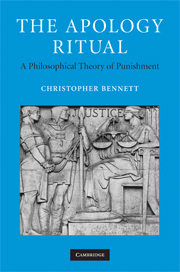6 - Restorative justice and state condemnation of crime
Published online by Cambridge University Press: 22 September 2009
Summary
In part II of this book I developed a ‘right to be punished’ defence of retributivism. My ‘right to be punished’ argument takes it that the central cases of wrongdoing involve qualified members of some intrinsically valuable relationship whose actions demonstrate a fundamental failure to respect the demands of that relationship. I argued that where the relationship is a genuinely valuable one, we have a duty to respect the wrongdoer's status as a member of that relationship (to give them the appropriate recognition). But if we are to treat such wrongdoers in line with their status as qualified members of these relationships they should be subject to what I called the cycle of blame and apology. Their action – and the lack of concern that it expresses – is something that cannot leave their relations with other participants in the relationship unaffected: the way to express this is through blame (the withdrawal of recognition); the way for the wrongdoer to undo it is through apology and reparation.
In part III I want to look at whether the cycle of blame and apology – which I take to be a familiar feature of our interpersonal relations – can shed any light on how a modern society ought to deal with those who commit those wrongs normally thought of as crimes. What I have argued for in part II is a conception of what the wrongdoer has a responsibility to do in response to wrongdoing.
- Type
- Chapter
- Information
- The Apology RitualA Philosophical Theory of Punishment, pp. 125 - 151Publisher: Cambridge University PressPrint publication year: 2008



